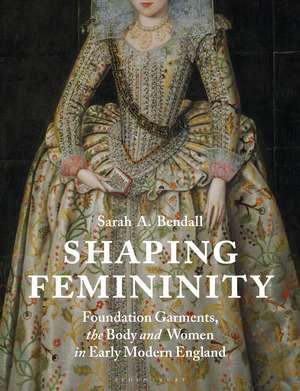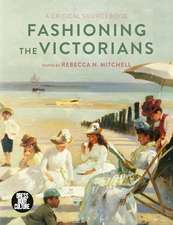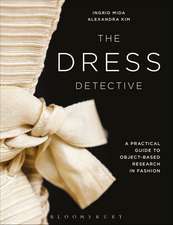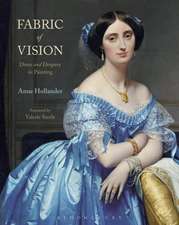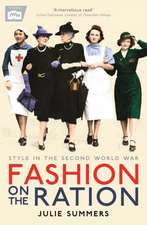Shaping Femininity: Foundation Garments, the Body and Women in Early Modern England
Autor Sarah Bendallen Limba Engleză Paperback – 3 noi 2021
Preț: 203.48 lei
Preț vechi: 230.03 lei
-12% Nou
Puncte Express: 305
Preț estimativ în valută:
38.95€ • 42.32$ • 32.74£
38.95€ • 42.32$ • 32.74£
Carte disponibilă
Livrare economică 31 martie-14 aprilie
Livrare express 14-20 martie pentru 78.58 lei
Preluare comenzi: 021 569.72.76
Specificații
ISBN-13: 9781350164109
ISBN-10: 1350164100
Pagini: 352
Ilustrații: 150 color and bw illus
Dimensiuni: 189 x 246 x 20 mm
Greutate: 0.96 kg
Editura: Bloomsbury Publishing
Colecția Bloomsbury Visual Arts
Locul publicării:London, United Kingdom
ISBN-10: 1350164100
Pagini: 352
Ilustrații: 150 color and bw illus
Dimensiuni: 189 x 246 x 20 mm
Greutate: 0.96 kg
Editura: Bloomsbury Publishing
Colecția Bloomsbury Visual Arts
Locul publicării:London, United Kingdom
Caracteristici
Explores the relationship between material culture and femininity by examining a wide range of women, from queens to courtiers, farmer's wives and even servants, uncovering their lost voices and embodied experiences
Notă biografică
Sarah A. Bendall is Research Fellow in the Gender and Women's History Research Centre, Institute for Humanities and Social Sciences, Australian Catholic University, Australia.
Cuprins
Acknowledgements Notes to the Reader AbbreviationsIntroduction1. The foundations of the body: foundation garments and the early modern female silhouette 2. The artificial body: courtiers, gentlewomen and disputed visions of femininity, 1560-16503. The socially mobile body: consumption of foundation garments by middling and common women, 1560 - 16504. The body makers: making and buying foundation garments in early modern England5. The everyday body: assumptions, tropes and the lived experience6. The sexual body: eroticism, reproduction and control7. The respectable body: rising consumption and the changing sensibilities of late seventeenth-and early eighteenth-century EnglandConclusion: legacies and misconceptionsGlossary NotesSelected BibliographyList of IllustrationsIndex
Recenzii
Virtually nothing is known about early modern undergarments, although they were clearly worn by (nearly) everyone. Moving beyond surviving inventories, images and objects, Bendall reconstructed her own garments in order to understand how they shaped the female body The result is a fascinating exploration of a - literally - disguised history, one that shows how female agency shaped and defined notions of femininity alongside the male gaze.
Sarah Bendall's fascinating exploration of women's foundation garments in Early Modern England shows not just how artisans made clothes, but how clothes made their wearers. Richly researched and beautifully illustrated, Shaping Femininity is both scholarly and accessible, and its innovative use of historical reconstruction ensures that it will become the essential study of female silhouettes before the Victorian corset.
Body shaping garments determined the social spaces females claimed, an embodied assertion, always political. Sarah Bendall's original and important interdisciplinary study reveals the gendered meanings of shaping garments, in elite and everyday life. History is enriched through her findings.
Shaping Femininity provides fascinating insight into female foundation garments in early modern England - their makers and wearers, their materiality and their meanings. With a richly evocative contextual background that takes in a wide range of texts, images, garments and objects, Bendall deftly shows how female bodies were a site of agency and contest, power and beauty. A powerful voice of the role of experiential learning, Bendall charts her own reconstructions of garments. The vital importance of making and experience is at the heart of this book, which insists that we take foundation garments - and the women who wore them - seriously.
Sarah Bendall's fascinating exploration of women's foundation garments in Early Modern England shows not just how artisans made clothes, but how clothes made their wearers. Richly researched and beautifully illustrated, Shaping Femininity is both scholarly and accessible, and its innovative use of historical reconstruction ensures that it will become the essential study of female silhouettes before the Victorian corset.
Body shaping garments determined the social spaces females claimed, an embodied assertion, always political. Sarah Bendall's original and important interdisciplinary study reveals the gendered meanings of shaping garments, in elite and everyday life. History is enriched through her findings.
Shaping Femininity provides fascinating insight into female foundation garments in early modern England - their makers and wearers, their materiality and their meanings. With a richly evocative contextual background that takes in a wide range of texts, images, garments and objects, Bendall deftly shows how female bodies were a site of agency and contest, power and beauty. A powerful voice of the role of experiential learning, Bendall charts her own reconstructions of garments. The vital importance of making and experience is at the heart of this book, which insists that we take foundation garments - and the women who wore them - seriously.
